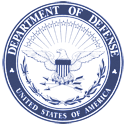Rescinded
This policy memo has been rescinded by DSCA 20-74.
 | DEFENSE SECURITY COOPERATION AGENCY | 4/26/2013 |
MEMORANDUM FOR :
DEPUTY UNDER SECRETARY OF THE AIR FORCE FOR INTERNATIONAL AFFAIRS
DEPUTY ASSISTANT SECRETARY OF THE ARMY FOR DEFENSE EXPORTS AND COOPERATION
DEPUTY ASSISTANT SECRETARY OF THE NAVY FOR INTERNATIONAL PROGRAMS
DIRECTOR, DEFENSE CONTRACT MANAGEMENT AGENCY
DIRECTOR, DEFENSE INFORMATION SYSTEMS AGENCY
DIRECTOR, DEFENSE LOGISTICS AGENCY
DIRECTOR, DEFENSE THREAT REDUCTION AGENCY
DIRECTOR, MISSILE DEFENSE AGENCY
DIRECTOR, NATIONAL GEOSPATIAL - INTELLIGENCE AGENCY
DIRECTOR, DEFENSE LOGISTICS INFORMATION SERVICE
DIRECTOR, DEFENSE LOGISTICS AGENCY DISPOSITION SERVICES
DEPUTY DIRECTOR FOR INFORMATION ASSURANCE, NATIONAL SECURITY AGENCY
DIRECTOR, DEFENSE FINANCE AND ACCOUNTING SERVICE
SUBJECT :
Revised Guidance for Transportation of Controlled Cryptographic Information, DSCA Policy 13-12, [SAMM E-Change 217]
Chapter 205 of the Defense Transportation Regulations (DTR) was recently revised to include the use of USTRANSCOM's Worldwide Express (WWX) contract approved carriers as an option for the OCONUS movement of unclassified and un-keyed controlled cryptographic items (CCI) in the Defense Transportation System. WWX may be used by the USG for international express small package transport and international heavy package transport for packages from letters to 300 pounds in weight.
The attached change to the Security Assistance Management Manual (SAMM) revises Chapter 7 to include WWX as a viable means of transporting unclassified and un-keyed CCI to an OCONUS location. The change also elaborates on other shipment options for CCI. Chapter 7 of the SAMM will be updated as reflected in the attachment, and this change will be included in the online version of the SAMM found on the DSCA Web Page, www.dsca.mil/samm/, as SAMM E-Change 217. This change is effective immediately.
If you have any questions concerning this guidance, please contact Mr. Todd Hughes, DSCA-STR/POL, todd.hughes@dsca.mil, (703) 604-6598.
Scott R. Schless
Principal Director
Strategy
ATTACHMENT :
As stated
CC :
STATE/PM-RSAT
AFRICOM
CENTCOM
EUCOM
NORTHCOM
PACOM
SOCOM
SOUTHCOM
TRANSCOM
USASAC
USASAC-NC
SATFA
TRADOC
NAVSUP WSS
NAVICP
NETSAFA
AFSAC
AFSAT
DISAM
MARCOR IP
SCETC
USCG International Affairs (G-CI)
SECURITY ASSISTANCE MANAGEMENT MANUAL (SAMM), E-CHANGE 217
Revised Guidance for Transportation of Controlled Cryptographic Items
Replace Chapter 7, Section C7.15.4., with the following revised text,
C7.15.4. Controlled Cryptographic Items (CCI). CCI are unclassified, but controlled secure telecommunications equipment and associated cryptographic assemblies, components or other hardware or firmware items that perform a critical Communications Security (COMSEC) function. All deliveries of CCI require the transfer of the item from the appropriate COMSEC Custodian in the United States Government (USG) to the purchaser's COMSEC Custodian. This transfer is documented via the SF-153 COMSEC Material Report, which requires the receiving COMSEC Custodian to notify the shipping COMSEC Custodian of receipt of the item. As there are special processes for release and transfer of CCI to partners and allies, recipients of CCI are divided into two groups with different transportation requirements for each.
C7.15.4.1. NATO Member States, Australia, and New Zealand. CCI procured through FMS to NATO members, Australia, and New Zealand becomes titled to those nations. These countries are permitted to move the articles through FMS freight forwarders, provided that in-transit visibility and accountability can be maintained at all times. The purchaser may impose more stringent controls on shipment of CCI when transporting outside the United States.
C7.15.4.2. All Other Recipients. In accordance with bilateral agreements with and release authorizations for COMSEC equipment to Non-NATO (excluding Australia and New Zealand) partners, the USG continues to retain title to the materiel. Accordingly, CCI must be transported to the recipient through DTS or by DTC 8 procedures. These procedures are valid for both the initial shipment and any required return of CCI to the U.S. Any exception must be approved by DSCA (Strategy Directorate).
C7.15.4.2.1. Defense Transportation System. Shipment of CCI by DTS ensures in-country delivery and receipt of the materiel to the receiving COMSEC custodian. Besides standard channel deliveries, other options for DTS movements are below.
C7.15.4.2.1.1. World Wide Express (WWX). WWX may be used by the USG to move CCI for OCONUS FMS customers. WWX provides international commercial express package (Letter to 300 lbs) time-definite, door-to-door pick-up and delivery, with accurate in-transit visibility service for DOD and USG Civil agencies. USG shippers must establish an account and arrange individual shipments. If CCI is shipped by WWX, external markings on the packaging must not identify the contents as CCI. For additional guidance on the use of WWX. See Chapter 202 of the DTR. AMC's Commercial Services provides details about establishing a WWX account and procedures at : http://www.amc.af.mil
C7.15.4.2.1.2. Defense Courier Service (DCS). DCS exists to provide secure, timely, and efficient end-to-end global distribution of classified and sensitive material for the United States and its allies. DCS provides an established courier network to transport qualified materiel. For additional information on the use of DCS, contact TRANSCOM's Defense Courier Division and Chapter 205 of the DTR.
C7.15.4.2.2. Delivery Term Code 8 Procedures. Shipment of CCI may occur by DTC 8 procedures if the recipient uses organic military assets and not contracted aircraft or vessels. For details on DTC 8 procedures, see DTR Part II, Appendix E.
